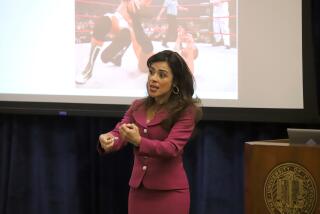Book Review : Help to Cope With the Fears of Success
- Share via
The Impostor Phenomenon; Overcoming the Fear That Haunts Your Success by Dr. Pauline Rose Clance (Peacetree: $14.95)
If I’m So Successful, Why Do I Feel Like a Fake? by Joan C. Harvey Ph.D., with Cynthia Katz (St. Martin’s: $14.95)
It is now believed that as many as 70% of all successful people have experienced some degree of fraudulence in achieving their success. Both Pauline Rose Clance, a practicing psychotherapist, and Joan C. Harvey, a clinical psychologist, address this syndrome in a “self-help” fashion.
It would not be extravagant to label ours the age of the divided self. The dimensions of the divisions are many. Our authors pursue one specifically--the chasm between how we “know” ourselves to be and how we experience others as believing us to be. But Clance and Harvey are more focused even than this.
Coping With the Difference
Their concern is to help us understand one particular, painfully recurrent experience of this chasm: having others accept and believe in us as accomplished, high-achieving people whose deeds merit praise, while experiencing ourselves as lucky, largely inadequate “impostors,” ill deserving such accolades. The “confession” of the impostor is that though highly successful, the achievements were really not the impostor’s own doing. Success thus is tarnished by fraudulence. Lurking behind such confessional candor is a nagging question that haunts the impostor’s days and ways: Would anyone care about me, respect me, if they knew my true nature?
An advantage--and disadvantage--of both Clance and Harvey’s work is their apparent non-conversance with recent psychoanalytic work in the same general area. Harvey, for example, discusses how a narcissistic parent, a parent worried about the child’s image as an extension of the parent rather than as an expression of self, contributes to the impostor phenomenon. Work on this topic by such recent writers as Kohut and Kernberg is not taken into account. The disadvantage in this is that some of the tangled complexity of human motivation is bypassed.
Clear and Readable
The advantage is that the studies are clear and readable; we feel upon concluding them that, yes, in fact, the problems are quite specific and specific things can be done about them. Vis-a-vis the density of psychoanalytic study, it is sometimes said that to know all is to forgive all. But it is equally often felt that to know all is to be hopelessly paralyzed to do anything about any of it. Clance and Harvey write differently. Theirs are in a broad and positive sense self-help books. We are told how to determine whether we are victims of the imposter malady and, if we are, what we might do to make our lives different.
Both authors are remarkably sensitive to the role of early and recurrent family experiences in forming the impostor’s vision of himself as lucky, as a fraud undeserving of our praise. Clance makes the deceptively simple observation that a person whose talents are atypical of his family’s is likely not to receive praise from that family for his accomplishments. Subsequently and as a direct consequence, he is likely to discount that praise from others outside the family, thereby increasing the experience of isolation and inadequacy typical of the impostor’s life. Harvey shows us how the tendency of families to label their children--the smart one, the spoiled one, and so on--contributes to the impostor experience.
Lacks Explanation
What one wants from the authors, however, perhaps a request too forbidden in its scope, is an explanation of why some people appear to satisfy most of the criteria of impostors, yet come from backgrounds exhibiting few of the traits construed as generative of impostors. And why some people seem virtually to have been saturated in such environmental solutions, yet are experienced by us and themselves as at one with themselves.
Beneath the helpful statistics and profiles our authors provide lie certifiable mysteries of human nature that beckon us to probe deeper. Had either author succumbed to such temptation, we would have had something other than self-help--perhaps more intriguing, but less practically helpful. In this lies a central limitation of these studies, yet a cardinal virtue as well.
Fear of Success
People do not fear failure only. At times they fear success as well--that it may separate them from others, that it may put certain demands on them they wish not to experience. Successes set us up for subsequent activities that could fail.
Since Oedipus, we have known that great falls require great heights from which to fall. Both Clance and Harvey make these points well.


